- Home
- Anthony Doerr
The Best American Short Stories 2019 Page 8
The Best American Short Stories 2019 Read online
Page 8
“When that misfortunate lady heard them branches crack and saw that young brushpile coming down,” Burley said, “her eyes popped out to where they looked at each other with some concern.”
For a while after he told Burley and Burley told Grover, every time Billy heard the men laughing, he fairly reliably would know why. His story was again being brought to mind, either by being told or by being alluded to. For of course the story belonged richly and complexly to Port William, pertaining about equally to its geography and its history. It was a part of its self-knowledge. It meant in Port William what it could not mean, and far more than it could mean, in any other place on earth. The ones who told it and the ones who heard it knew the abandoned field and the brushy fencerow at the lower end of Birds Branch. They knew the Blue Hole and the big briar patch. They knew Billy Gibbs, the boy he had been and was. They knew the nature and character of box elders. They had kept the stories of a greedy and miserly, eccentric and amusing family known around Port William as Leverses, who down at Hargrave were a family of greedy aristocrats know as La Veres. The tellers and hearers of the story understood in an ever-renewing instant the entire signification of their vision of the august Forrest La Vere conjugating the commonplace old verb upon an extracted back seat in a weedfield. Thus, for the men, the story was a way of knowing what they knew, and a way of teaching the boys. And of course the story made its way from the gathering places of the men into the kitchens and bedrooms round about and came to belong also to the Port William housewives and big girls.
From the night in the winter of 1938 when Billy set it free, his story was one of Port William’s ways of knowing itself, but only for a few years. And then came the great tearing apart of the war and what followed. A new time came, different from any that had been before. Then, as the elders made their way one by one to their settled places in the graveyard, too many of the young became known to Port William mainly by their absence. Tom Coulter and Virgil Feltner and others perished in the war. The war promoted Billy Gibbs from tree climbing to flying. He went into the air as a member of the crew of a B-17, and flew at last safely back to the ground with maybe a story or two he was not so eager to tell. And then he went to college, and from there, as his mother put it, “into a suit and into business.” That was the defining story then, of Port William and thousands of places like it. It was the story of the young people, changed by the change of times, who by the war’s end or the midcentury had found their way to city jobs and salaries or high wages, and who returned after that only to visit a bedside in a nursing home, at a loss for something to say, or to bury the dead.
I heard the story of The Great Interruption only a few times in the years after the war. It was becoming less and less a property of its old community in time and place. Grover Gibbs and Burley Coulter, remarkably, had ceased to tell it. I think it had begun to make them sad. Port William by then was losing its own stories, which were being replaced by the entertainment industry, and so it was coming to know itself only as a “no-place” adrift with every place in a country dismemoried and without landmarks.
Finally, if Billy’s old story were to be told, it would have to stand alone, bereft of the old knowing-in-common that once enriched it. It would be heard then as little more than a joke on the subject of what we have learned to call “sex,” a biologic function disassociated from everything but itself. If one of the professionally successful descendants of the place as it once was were to tell it, say, at a cocktail party, it would be understood as an exhibit of the behavior of rural Kentuckians, laughable in all their ways, from which the teller had earned much credit by escaping.
Of the five children of Grover and Beulah Gibbs—Billy, Althie, Nance, Sissy, and Stanley—only Althie stayed close enough to accompany her parents and watch over them and share her life with them as long as they lived.
One day in the year or so between Burley’s death and his own, Grover and I were sitting and talking on the tailgate of his old pickup truck. Grover had been kind to me ever since I was little. He was one of my own dwindling small company of elders, and I loved to talk with him. We were talking, as we often did, of the changes that even I, younger than Grover by nearly forty years, had witnessed in Port William and the country around. We were telling of course the story, clearly ongoing and with no foreseeable end, of the departure of the people and the coming of the machines.
I said, “And the poor old ground is going to suffer for it.”
Grover faced things by preference with a grin or a laugh that was honest enough, for he had faithfully observed and relished the funniness of the world. But he could give you a straight look sometimes that would make you shiver.
“Andy,” he said. “Honey, I know you know. The hurts ain’t all just only to the ground.”
JAMEL BRINKLEY
No More Than a Bubble
from LitMag
It was back in those days. Claudius Van Clyde and I stood on the edge of the dancing crowd, each of us already three bottles into one brand of miracle brew, blasted by the music that throbbed from the speakers. But we weren’t listening to the songs. I’d been speaking into the open shell of his ear since we’d gotten to the party, shouting a bunch of mopey stuff about my father. Sometime around the witching hour, he stopped his perfunctory nodding and pointed toward the staircase of the house. “Check out these biddies,” he said. Past the heads of the dancers and would-be seducers I saw the two girls he meant. They kept reaching for each other’s waists and drawing their hands quickly away, as if testing the heat of a fire. After a minute of this game the girls laughed and walked off. We weaved through the crowd and followed them, away from the deejay’s setup in front of the night-slicked bay windows, and into the kitchen where we took stock of the situation. One of the girls was lanky and thin-armed, but notably rounded at the hips. She wore a white tank top, which gave her face and painted fingernails a sheen in the dimmed light. A neat ladylike Afro bloomed from her head, and she was a lighter shade of brown than her friend with the buzz cut, a thick snack of a girl whose shape made you work your jaws.
The party, thrown by a couple of Harvard grads, happened just weeks before the Day of Atonement, in late September of 1995. Claudius had overheard some seniors talking about it earlier that Saturday after the football game, as they all smoked next to the pale-blue lion statue up at Baker Field. Later he dragged me from my dorm room. We slipped out of the university’s gates and took the subway down to Brooklyn, determined to crash. The party had been described as an affair for singles, so when you arrived you had to fill out a sticker that read “Hi, my name is . . .” and affix it to your body. The taller girl in the tank top had placed hers on her upper arm, like a service stripe. Her friend wore the sticker on her rump, and this was both a convenience and a joke meant to shame us. Neither of their stickers bore a name.
“Dizzy chicks,” Claudius said to me, and we gave each other goofy grins. The main difference between a house party in Brooklyn and a college party uptown was that on campus you were just practicing. You could half-ass it or go extra hard at a campus party, either play the wall or go balls-out booty hound, and there would be no actual stakes, no real edge to the consequences. Nothing sharp to press your chest against, no precipice to leap from, nothing to brave. You might get dissed, or you might get some play. You would almost certainly get cheaply looped. But at the end of the night, no matter what, you would drift off to sleep in the narrows of a dorm bed surrounded by cinderblock walls, swaddled in twin extralong sheets purchased by someone’s mom.
We approached the girls, pointed to our stickers to introduce ourselves, and asked for their names. The tall one with the Afro said her name was Iris and did so with her nose, putting unusually strong emphasis on the I. True to this utterance, she seemed the more insistent and lunatic of the two. She vibrated. We asked where they were from. Most of Iris’s family came from Belize. Her friend with the buzz cut, Sybil, was Dominican. Claudius and I liked to know these kinds of things.
/> “You enjoying the party?” I asked. Iris didn’t respond. Her attention flew all over the place. The house we were in was old—you felt its floorboards giving, perceived its aches being drowned out by the music and conversations that swelled with everyone’s full-bellied bloats of laughter. In hushed moments, you heard the creaking of wood, followed by the tinkle of glass, the crunch of plastic, or the throaty rise of the hum. Iris seemed attuned to all of it, to every detail of the party house and its subtle geographies. She stared now through the glass doors leading to the backyard, where torches showed little groups of smokers breathing into the air.
I tapped her on the shoulder.
“Oh, hello again,” she said and then looked at her friend.
“Yep, they’re still here,” Sybil said.
“Enjoying the party?” I repeated.
“We’re bubbling,” Iris said. From the living room the deejay began to play a new song. “What is this?” she said. “I know this.”
“That new shit,” said a guy standing near us. He had a patchy beard and double-fisted red cups of foamy beer. Maybe he was a Harvard man. “Newest latest,” he said. “‘Brooklyn Zoo.’ Ol’ Dirty Bastard.”
Claudius and the girls nodded in recognition but to me it all sounded like code.
“Why’s he called that?” I asked.
The guy laughed. “Because there’s no father to his style.”
The girls turned to each other and began a kind of stomping dance. “Damn damn damn,” Iris said, “this song is so bubble!”
They seemed to understand the good life according to the image and logic of this word—simultaneously noun, verb, and adjective—its glistening surface wet with potential meaning. As they danced, their faces became masks of tension, nostrils and mouths flexed open. Iris kept her arms pinned to her sides while Sybil jabbed the air with her elbows. Claudius jerked his chin at Sybil and told me, “I call dibs.”
“Nah, man.”
“Already called it.”
We both preferred girls of a certain plumpness, with curves—in part, I think, because that’s what black guys are supposed to like, because liking it felt like a confirmation of possessing black blood, a way to stamp ourselves with authenticity—but he had made his claim. I was left to deal with Iris, the prophetess of the bubble. Fine, no big deal. Claudius could have his pick. This was all his idea anyway. We wouldn’t be here if it weren’t for him. He knew I needed a good distraction.
A few weeks earlier, late one August morning in Philadelphia, shortly before the start of sophomore year, I sat with my father, Leo, at the kitchen table and got drunk with him for the first time. He told me to beware of crazy women, angry women, passionate women. He told me they would ruin me. “But they are also the best women,” he said, “the best lovers, with a jungle between their legs and such wildness in bed that every man should experience.” I knew the kinds of women he meant. I also knew he was talking about my mother, but I didn’t give a damn. She had left us, left him, a few years earlier, and recently she’d announced she was getting remarried. I saw how this news affected my father. He had stalked around our house all summer and appeared smaller and more frantic by the week. He searched as though the answer to the question of how his life had gone so wrong was hidden in one of the rooms. All but undone by this effort, my father regarded me that morning through his heavy eyelids and long Mediterranean lashes. He’d inherited bad teeth from his own father and before he turned sixty had had a bunch of them yanked out. He wore a dental partial but didn’t have it in as we drank. The bottom of his face was collapsed like a rotten piece of fruit. “The best,” he repeated. “And so.” His Italian accent deepened the more he drank. His tongue peeked out of his broken grin. “And so every man should experience this, Ben,” he said. “Once.” He held a chewed fingernail up by his high nose and then reached into his pocket for something. It was a condom, wrapped in silver foil. “Use this with the most delicious woman you can find, una pazza. Let her screw your brains out, once and never again. Then marry a nice, boring, fat girl with hands and thighs like old milk. Making a dull life is the only way to be happy.” He gave me the condom. It was an ill-timed ritual—I’d already gone out into the world—but he believed in it, just as he believed there was a way to be happy. Since I was his disciple, and quite drunk that morning, I believed in it too.
At the house party, Claudius and I slid in behind the girls and danced with them right there in the kitchen. Iris moved well but with aggression. She spun around, hooked her fingers into my belt loops, and slammed her pelvis into mine. She grinded herself against me for a while and then backed away to show her perfect teeth and claw the air between us. She was a kitten on its hind legs, fiercely swiping at a ball on a string.
I leaned in and asked if she’d gone to Harvard too. I tried to sound older, like I’d already graduated and was fully a man.
“We’re Hawks,” Iris said in her nasal voice, and then she spread her arms like wings. Claudius had a theory about girls with nasal voices that I now appreciated anew. The theory was that girls who spoke this way, cutting their voices off from their lungs and guts, did so as a kind of defense, a noisy insistence meant to distract men from the flesh.
“Hawks?”
“Hunter College, ’94. Hey, why don’t you get me and my girl some whiskey bubbles?”
“That’s whiskey and . . . ?”
“Magic.”
“Huh?
“Just whiskey,” she whined, with a disappointed shake of her head. “Be a good boy.”
Passing Claudius and Sybil as they danced, I nodded to let him know we were in. The sensation of Iris’s moving hips ghosted against me. Floating there in the face of the kitchen cabinet were her pretty smile and dark eyes, flecked with a color close to gold.
After making four healthy pours of Jack, I carried the cups back over. Sybil sniffed the whiskey and let her eyes cross with pleasure. Iris lifted her cup and with a dignified tone and expression said she was thankful for the universe and all of its moments.
“And for whiskey and music and madness and love,” she added.
“And for the sky,” Sybil said. “Have you seen the fucking sky tonight?”
The words were meaningless. It was a toast to nonsense.
“And for your tits,” Iris said. She reached out and squeezed Sybil’s right breast. “Doesn’t she have great tits?”
“She does,” Claudius said, staring at them. “She really does.”
Claudius had come to Columbia from West Oakland with certain notions regarding life in New York, that the city’s summer heat and dust, its soot-caked winter ice, were those of the cultural comet, which he ached to witness if not ride. Because of these notions, he manipulated gestures and disguises, pushed the very core of himself outward so that you could see in his face and in the flare of his broad nostrils the hard radiance of the soul-stuff that some people chatter on about. Though not quite handsome, he was appealing. He could convince you he was beautiful. For this trickery his implements included a collection of Eastern-style conical hats and retro four-finger rings. His choice for tonight: a fez, tilted forward on his head so that we, both of us, felt emboldened by the obscene probing swing of the tassel.
He and I knew what we were toasting: the next phase of life. At parties like this the crowd was older, college seniors who already had New York apartments, graduates who were starting to make their way, and folks who were far enough into their youth to start questioning it. The booze was better and the weed was sticky good. The girls were incredible, of course, especially here. You could taste a prevalent Caribbean flavor in the air, as if the parade through Brooklyn’s thoroughfares on Labor Day had never stopped and this had been its destination all along. If not Caribbean like Sybil, then the girls were something else distinct and of the globe. These girls each had her own atmosphere. We were convinced they wore better, tinier underwear than the girls we knew, convinced they were mad geniuses of their own bodies.
“So wher
e’d you two escape from?” Iris asked, though her gaze drifted out to the backyard again.
“Uptown,” Claudius said. “Columbia.”
“Roar, Lion, Roar,” Sybil said, mocking us.
“We graduated in May,” I lied.
“Mazel tov,” Iris said.
Sybil shook her head.
Iris’s attention snapped all the way back now. “What? I can totally say that.”
Sybil made a popping sound with her mouth, and the two of them laughed.
Claudius and I laughed too, though neither of us knew what was funny. Before we could pick up the thread of the conversation, the girls left us without saying a word.
We slid up the stairs after them and wound past the partygoers perched there gossiping or flirting or losing themselves in the privacies of thought. On the second floor, a group of people stood shoulder to shoulder in the doorway of one room, as though to block something illicit from view. Claudius and I pushed past them and found ourselves in an immense bathroom, where voices echoed off the tiles. Two girls stood fully clothed in a Jacuzzi painted a tacky shade of powder blue, their heads framed by a backlit square of stained glass over the tub, but they weren’t our girls. Back in the hallway, we caught Iris and Sybil coming out of a bedroom, trailed by the skunky sweet odor of marijuana. We pursued them downstairs.
Claudius took a step toward them and said, “So let’s play a game.”
For a moment the girls acted as though they had never seen us before, then Sybil’s eyes widened. “Wow,” she said.
Claudius announced that we should all trade confessions. “Shameful stories,” he said. “Secrets. The worse they are, the better.”
They seemed amused but unwilling.
He went on anyway. “Who wants to go first?” he said, and waited. But it was just a sham. Of course Claudius would be the one to start.
He and I knew exactly what we were aiming to achieve in these moments. It involved patience and strategic silences and then, when we did speak, a distinct lowering of our voices—even in loud places, so that we would have to lean in—and eye contact that was both firm and soft, not a stare, that broke occasionally to let our gazes trickle down the full lengths of their bodies. Less wolfish than a leer, more a sly undressing. The total effect would be a kind of hypnosis, a gradual giving of the self. As we developed it, this method had worked with the girls on campus, but we knew that this was nothing to be proud of. College is nothing if not four years of people throwing themselves wildly at each other.

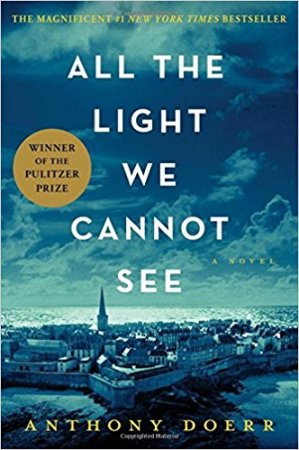 All the Light We Cannot See
All the Light We Cannot See About Grace
About Grace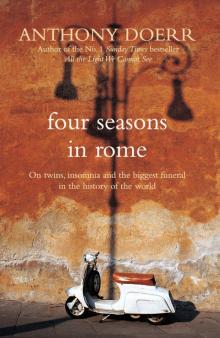 Four Seasons in Rome: On Twins, Insomnia, and the Biggest Funeral in the History of the World
Four Seasons in Rome: On Twins, Insomnia, and the Biggest Funeral in the History of the World Memory Wall
Memory Wall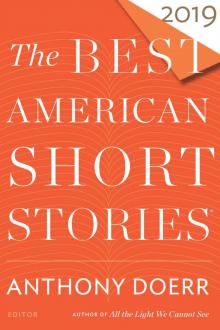 The Best American Short Stories 2019
The Best American Short Stories 2019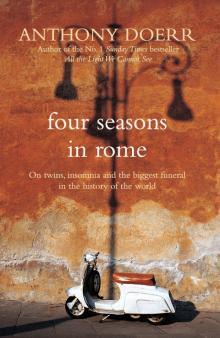 Four Seasons in Rome
Four Seasons in Rome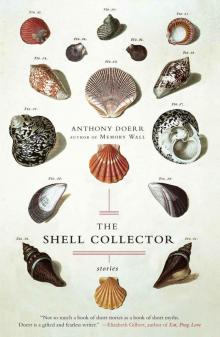 The Shell Collector
The Shell Collector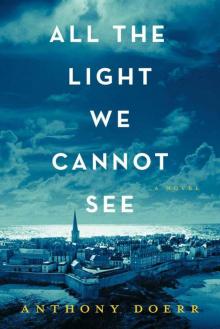 All the Light We Cannot See: A Novel
All the Light We Cannot See: A Novel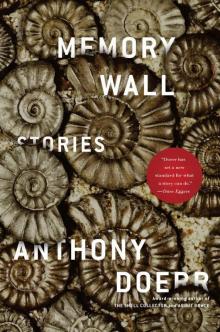 Memory Wall: Stories
Memory Wall: Stories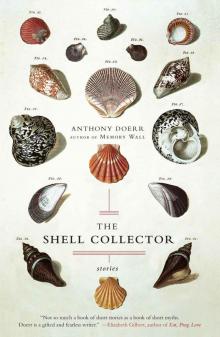 Shell Collector
Shell Collector